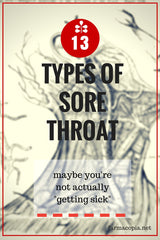 Author: Lily Mazzarella
Author: Lily MazzarellaGet to know your Ring of Fire
Since the mouth and pharynx comprise the opening of the digestive AND the respiratory system, it makes sense we would have a strongly defended gateway there. I call the back of the throat the “ring of fire”: a dense clustering of lymphatic tissue. This body-smart adaptation allows us to mount an immune response at the periphery of the body and (hopefully) keep viruses, bacteria, and molds at bay. It also means that when this tissue is in *activated fighting* mode, inflammation, soreness, and overt pain can arise as it works to protect us.
But what we call a “sore throat” can arise for a number of reasons. What we perceive as our “throat” is dynamic area influenced by such diverse factors as our environment, the use of our vocal cords, the state of our sinuses and Eustachian tubes, and the upper gastrointestinal tract.
I’m a sore throat kind of gal. It took me a long time to realize that not every sharp swallow meant I was getting sick. This frequent—and vexing—symptom led me to study the causes and contributing factors to sore throat. Now, instead of obsessively swallowing and worrying, swallowing and worrying, I note the sensation and try to figure out what causes might be contributing right now. That way, I have the best shot at addressing it.
 So let’s take a deeper look at sore throat: Infectious sore throat
So let’s take a deeper look at sore throat: Infectious sore throat
Most of us associate sore throats with getting sick, or being sick. Indeed many sore throats are caused by viruses and, less commonly, by bacteria. Both can be accompanied by fever and general malaise.
Sore throats are caused by viral illnesses are self-limiting. Sore throat from a cold should resolve in 5-10 days, while flu, chickenpox, and mono may take longer. Bacterial infections usually require treatment.
Viral causes of sore throat include:
- Common cold
- Flu
- Mono (Epstein Barr Virus, or EBV)
- Chickenpox
- Croup
Bacterial causes of sore throat include:
- Strep, aka Streptococcus pyogenes, or group A streptococcus
- Whooping cough
Other causes of sore throat include:
Environmental allergies: Allergies to molds, pet dander, dust mites and pollen can cause a sore throat, which can—bafflingly—be the ONLY allergy symptom you experience. There are so many effective natural supports for allergy: Farmacopia’s Allergy Alert Tincture gets the job done for many of my clients, without the cognitive and overly-drying side effects of conventional OTC and pharmaceutical meds.
Post-Nasal Drip: Do you wake with a sore throat? Irritative mucus can drip into the back of the throat, especially at night. This can be related to allergies, or other chronic inflammation in the sinuses, such as fungal infection. Nighttime congestion also causes mouth breathing, which is terribly vexing for all the tissues in the mouth and throat.
Dryness: Sore throats that occur in dry environments, such as desert or mountainous areas, and indoors in winter when buildings are heated, make you more susceptible to any other factors that want to get at your throat. The aforementioned mouth breathing is also a major contributor to dryness. Make sure you are properly hydrated (so many of us are not, especially in fall and winter!), and opt for moistening remedies like licorice tea, cold marshmallow root infusions, slippery elm, and aloe juice. Traditional Medicinals’ Throat Coat tea is always a winner! Humidifiers help tremendously.
Food sensitivities & allergies: Sore throat immediately after eating food can indicate an intolerance (or true allergy). Take note. I had a sore throat every morning after my precious wheat toast for about 12 years, until I finally wised up. I have my clients track this symptom during the re-challenge phase of elimination diets.
Pollution/particulate: City living, and living near highways or industry can increase your chances of sore throat, as the “ring of fire” gets chronically activated in its attempts to neutralize chemical and physical threats from air pollution. Every time I visit my New York City my sore throat convinces me I’ve gotten sick—until I blow my nose and see the gray-black soot caught by my nasal hairs. Neti pots and gargles go a long way in mitigating the effects of these irritants.
Smoking: Duh. If you smoke, obviously you’re exposing your throat to myriad inflammatory carcinogens on a daily basis, so, no surprise there. I smoked for many years—and always had a sore throat. It actually worsened for a few weeks after I quit: my poor nerves were coming back to life, and the tissue was finally able to go about the work of healing itself.
GERD (gastroesophageal reflux disease, aka heartburn): If your lower esophageal sphincter loosens, which can occur for a variety of reasons, including stress, medications, and food triggers, stomach acid can splash up your poor esophagus, which is NOT adapted to handle a liquid with the pH of battery acid. Other symptoms of GERD can include: the sense of something lodged in your throat, chest pain, heartburn, and food coming up your windpipe. Some people have silent reflux—which is pretty much asymptomatic, or may have an “unrelated” symptom, like chronic cough, or you guessed it, sore throat. If you have GERD, work with a practitioner to find the root causes and heal your digestive tract.
Vocal strain and overuse: The muscles in your throat are subject to strain, just like the muscles anywhere else in your body. People who talk for a living can be prone to “boggy” sore throats, which respond well to astringent remedies such as sage and yarrow gargles, green tea, and plain old salt water gargling. Talking in noisy environments, such as restaurants and parties, and shouting at a game or rally can trigger sore throat.
And let’s deviate a little from conventional takes on sore throat:
Yin deficiency: In Chinese medicine, frequent sore throat can be a sign your Yin is depleted—the cooling, moistening, anchoring principle that tempers our more fiery and active Yang. Our non-stop daily life depletes yin, as does stress, infection, sleep loss, breast feeding, and dietary imbalances. A yin deficient sore throat feels hot-dry-scratchy-irritated and may be hard to distinguish from the “am I getting sick?” sore throat. It tends to be worse at later in the day or at night, and is accompanied by other yin deficient signs: irritability, fatigue, restlessness, insomnia, night heat/sweats, and dry mouth/thirst. Having burned the candle at both ends for much of my life, I frequently have this sore throat, and I see it in many of my clients. I address it with hydration, lifestyle measures, and yin nourishing tonics such as licorice, American ginseng, white peony, anemerrhana, and rehmannia. Recognizing a yin deficient sore throat can liberate you from obsessive worry that you’re getting another cold. And addressing it restores your WHOLE system.
Chronic viral infections: Viruses are crazy: they are not quite “alive” until they hijack our cellular machinery, and many reside in us, mostly dormant, forever. I see many clients with chronic sore throat who have high titers of EBV and other Herpes family viruses. Whether this is causative or correlated, I do not know—though I have seen sore throat skyrocket during documented reactivation of any of these infections. And I have seen simple oral herpes cause relapsing sore throat. This may be associated with an “immune dip” caused by the body’s work to resolve the flare, or just another sign that a person is rundown and not able to mount an optimal immune, and therefore susceptible to common viral and bacterial incursions. Reishi mushroom and monolaurin (a fatty acid with anti-viral properties derived from coconut) are my go-tos here.
Candida: Your throat can be affected by candida in the same way your vagina can. Candida can infiltrate the esophagus (this is confirmed with biopsy), and impact the sinuses and Eustachian tubes. Candida is a commensal organism—we’re supposed to co-exist with it—but it is also opportunistic, and when a person is rundown, taking antibiotics (candida is a yeast, so doesn’t get killed off), or eating a very high sugar diet, it can flourish and cause inflammation in the mucous membranes of the body. If you know or suspect you have candida, work with a practitioner to get the right diet, herb, and probiotic protocol in place.
Depletion: Watch when your sore throats tend to show up. They can be the sign you need to leave the party, say no to social engagement, or stay home from work and get some serious restoration time.
For smart self-care to protect and nourish your throat, see Practical Tactics for Your Points of Entry in our Fall Guide.


 So let’s take a deeper look at sore throat: Infectious sore throat
So let’s take a deeper look at sore throat: Infectious sore throat